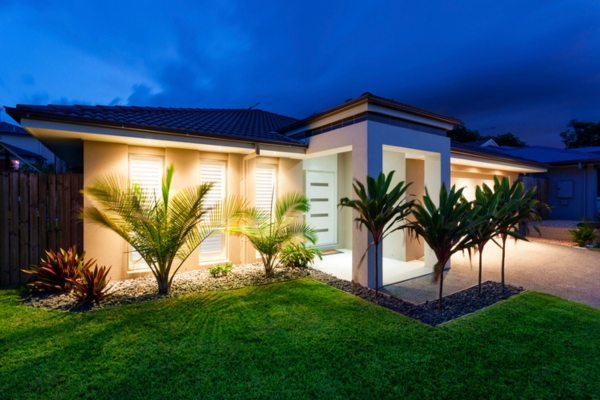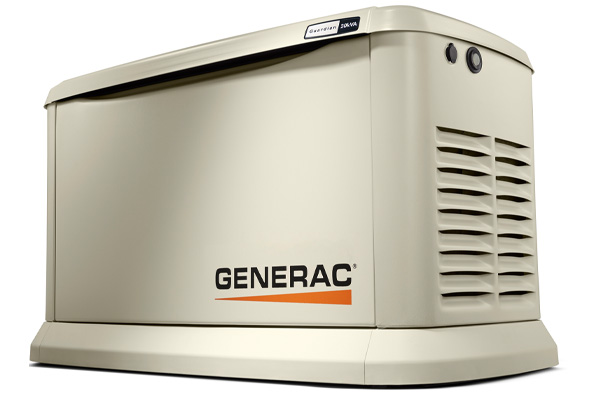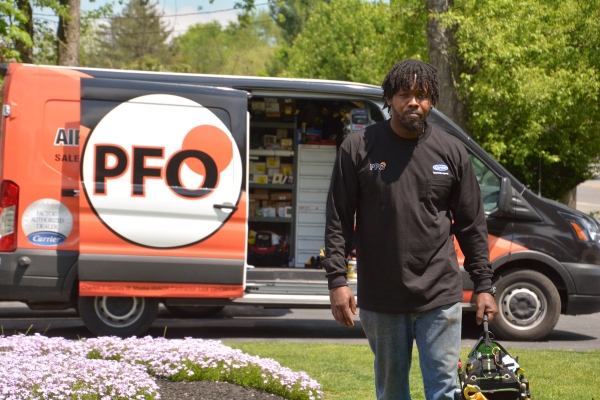
Ensuring uninterrupted power in the event of outages is a top priority for homeowners. When confronted with this need, the choice of a whole house backup generator or a portable generator often arises. Both options offer distinct advantages and considerations, underscoring the importance of understanding their differences to make the best decision for your household.
This article by PFO Heating & Air Conditioning delves into the essential disparities, benefits, and key factors to consider when weighing the choice between whole-house and portable generators. We aim to provide insight for uninterrupted comfort and security in your home.
Exploring the Fundamentals of Generators
Contents
- 1 Exploring the Fundamentals of Generators
- 2 Comparison & Key Consideration for Whole-House Generators and Portable Generators
- 2.1 Power Capacity & Coverage of a Backup Generator
- 2.2 Automatic Activation of Whole-House Backup Generators
- 2.3 Effortless Transition of a Standby Generator
- 2.4 Continuous Fuel Supply
- 2.5 Long-Term Reliability
- 2.6 Quieter Operation
- 2.7 Enhanced Property Value with a Whole House Generator
- 2.8 Professional Installation of Whole-House Backup Generators
- 2.9 Maintenance & Monitoring Of Power Generators
- 2.10 Environmental Impact Considerations
- 2.11 Emergency Preparedness Enhancement
- 3 Conclusion
- 4 Contact PFO Heating & Air Conditioning for Standby Generator Solutions
Whether whole house or portable, generators serve distinct purposes and vary significantly in capacity. Whole-house generators constitute permanent installations designed to supply power to an entire residence in the event of grid failure. These systems are integrated into the home’s electrical panel and are fueled continuously, commonly by natural gas or propane.
On the other hand, portable generators are compact, mobile units intended for temporary use. They offer power solutions for essential appliances and devices during outages, with the flexibility to be moved around the premises as needed. Portable generators typically rely on gasoline or propane as their fuel sources, providing a versatile alternative to whole-house systems.
Comparison & Key Consideration for Whole-House Generators and Portable Generators
Several crucial factors warrant consideration when deciding between whole-house and portable generator systems. Here, we delve into these aspects to aid in your decision-making process.
Power Capacity & Coverage of a Backup Generator

A whole-house backup generator boasts substantial power capacities ranging from 15,000 to 50,000 watts or more. This robust capability allows them to supply electricity to an entire household, powering essential circuits, including lighting, HVAC systems, refrigeration, and various appliances.
In contrast, portable generators offer more limited power capacities, typically falling between 1,000 to 10,000 watts. While sufficient for essential appliances, their constrained capacity may not adequately support the simultaneous needs of an entire household. Whole-house generators excel in providing comprehensive coverage, ensuring the operation of all critical circuits during outages, whereas portable generators necessitate more selective power management.
Automatic Activation of Whole-House Backup Generators

One of the standout features of whole-house generators is their automatic activation functionality when confronted with a power outage. Equipped with an automatic transfer switch (ATS), these systems swiftly detect interruptions in power and seamlessly switch on the generator. In contrast, portable generators require manual setup, involving tasks such as starting the generator, connecting appliances, and managing the fuel supply.
The automatic activation of whole-house generators eliminates the need for user intervention, guaranteeing hassle-free power restoration during outages. This convenience distinguishes them as a reliable and user-friendly backup power solution for homeowners.
Effortless Transition of a Standby Generator

Whole-house generators seamlessly transition into action during power outages by implementing an automatic transfer switch (ATS). This switch detects the outage and triggers the generator’s activation within seconds, ensuring uninterrupted power flow throughout your home. In contrast, the manual startup and connection required for portable generators result in noticeable downtime during the power transfer.
Don’t wait for a power outage to strike. Reach out to PFO Heating & Air Conditioning now for expert standby generator solutions
Continuous Fuel Supply
Whole-house generators boast a continuous fuel supply, often linked to your home’s natural gas line or a sizable propane tank. This setup enables the generator to operate for extended periods without interruption, offering sustained power during prolonged outages. Conversely, portable generators necessitate frequent refueling with gasoline or propane, introducing inconvenience and potential disruptions during extended power loss scenarios.
Long-Term Reliability

Whole-house backup generators are engineered as long-term solutions, prioritizing durability and longevity. Constructed to withstand diverse weather conditions, they exhibit resilience and can endure for many years with proper maintenance.
In contrast, portable generators have a comparatively shorter lifespan and may need more frequent replacements or repairs. Consequently, they are less suited as enduring backup power solutions for prolonged outages.
Quieter Operation

A whole house backup generator is known for its subdued operation in comparison to portable alternatives. Equipped with sophisticated sound-reduction features, they are engineered to emit minimal noise during use.
This quieter operation minimizes disruption within your household and extends to your neighbors, fostering a more tranquil environment during power outages. In contrast, portable generators often generate more noise, contributing to significant sound pollution, particularly noticeable during prolonged outages, which can cause concern.
Enhanced Property Value with a Whole House Generator
The installation of a whole house backup generator holds the potential to boost property value substantially. These generators are integrated as permanent fixtures within your home’s electrical system, signifying a long-term investment in reliable backup power. This permanence enhances the appeal of your property to potential buyers, who perceive it as a valuable asset, offering enduring peace of mind during outages.
Conversely, portable generators are perceived as temporary solutions and yield a different positive impact on property value. Consequently, homebuyers often prioritize homes equipped with whole house generators, ultimately contributing to a higher perceived property value.
Professional Installation of Whole-House Backup Generators

Ensuring professional installation is paramount when integrating whole-house backup generators into your home’s electrical system. These complex systems demand expertise to ensure seamless operation and safety. Certified electricians and HVAC technicians are trained to assess your home’s unique requirements, determine the optimal generator size, and execute the installation accurately.
Conversely, improper setup of portable generators can introduce significant safety risks. Directly connecting them to your home’s wiring without a transfer switch can result in back-feeding power into utility lines, endangering utility workers and creating fire hazards. Professional installation and adherence to safety protocols are imperative for both whole house and portable generators, with particular emphasis on whole house systems due to their intricate integration into your home’s infrastructure.
PFO Heating & Air Conditioning can handle your standby generator needs with precision and expertise. Get in touch with us today!
Maintenance & Monitoring Of Power Generators
Whole-house generators typically incorporate automatic monitoring and maintenance features. These systems conduct regular self-checks to ensure optimal functionality and promptly alert the homeowner or monitoring service of any issues. This automated approach facilitates timely maintenance or repairs by trained professionals, minimizing the homeowner’s active involvement in monitoring and upkeep.
In contrast, portable generators require more hands-on maintenance. Owners must manually inspect oil levels, fuel stability, and other components and perform maintenance tasks such as filter replacement. Unlike whole-house systems, portable generators lack automated self-diagnostic features, placing greater reliance on the owner’s diligence for maintenance and upkeep.
Environmental Impact Considerations

When evaluating the environmental impact, it’s crucial to consider the differences between whole-house and portable generators. Whole-house generators, particularly those fueled by natural gas or propane, typically exhibit a smaller environmental footprint than their portable counterparts. They emit cleaner emissions and are subject to stricter regulations governing emissions. For example, natural gas generators emit fewer pollutants and greenhouse gases than their diesel or gasoline-powered portable counterparts.
Additionally, whole-house generators often demonstrate higher fuel efficiency, reducing fuel consumption and lower overall emissions. Opting for a whole-house generator utilizing cleaner fuel sources and boasting lower emissions can significantly contribute to a more eco-friendly backup power solution. Conversely, portable generators, reliant on gasoline or diesel fuel with higher emissions, generally have a less favorable environmental profile.
Ensure uninterrupted comfort during power outages. Call PFO Heating & Air Conditioning now to discuss your standby generator options!
Emergency Preparedness Enhancement
Whole house generators enhance emergency preparedness by providing a reliable, uninterrupted power supply during prolonged outages. They also serve as a cornerstone in upholding essential household functions, including maintaining heating during winter and cooling in the summer, preserving refrigeration to prevent food spoilage, and powering critical medical equipment when necessary.
This level of preparedness ensures that households can endure extended power disruptions without compromising comfort, safety, or essential services. In contrast, relying solely on portable generators for these purposes can be less reliable and convenient due to their limited capacity and the necessity for manual operation.
Conclusion
Whole-house backup generators emerge as a definitive choice for homeowners seeking a comprehensive and dependable power solution during outages. Their superior capacity, automatic activation, seamless transition, and minimal maintenance requirements offer peace of mind and heightened safety.
When deliberating between whole-house and portable generators, the decision should hinge on long-term power requirements and the significance of convenience, safety, and property value. Investing in a whole-house generator is a prudent decision for homeowners prioritizing an uninterrupted and worry-free electrical supply during emergencies.
Contact PFO Heating & Air Conditioning for Standby Generator Solutions
PFO Heating & Air Conditioning is the premier generator installation and maintenance provider in the Greater Princeton, NJ, area. Our expertise transcends mere installation; we specialize in generator replacements, repairs, and comprehensive maintenance. Our team comprises top-tier service contractors, each meticulously trained in cutting-edge generator technologies and techniques, ensuring unparalleled service quality.
Choosing PFO Heating & Air Conditioning means gaining access to industry-leading expertise. Whether you prefer reaching out online or calling us, our knowledgeable professionals are poised to address all your generator-related inquiries. Furthermore, we offer complimentary, in-home estimates to tailor our services precisely to your needs.
Contact PFO Heating & Air Conditioning today to learn more about our services. We’re committed to addressing all your questions and concerns promptly and efficiently. Contact us now!
Click here to contact us now or call us at (800) 253-9001 to find out more! Click the link to view our service area.

Related Articles:



